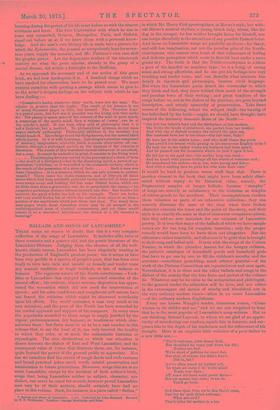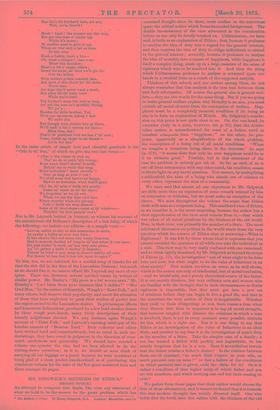BALLADS AND SONGS OF LANCASHIRE..
THERE seems no reason to doubt that this is a very complete collection of the songs of Lancashire. It includes alike tales of three centuries and a quarter old, and the poetic literature of the Lancashire Distress. Judging from the absence of all the well- known classic names, Lancashire has been singularly wanting in the production of England's greatest poets ; but it seems to have been very prolific in a species of people's poet, that has-been ever ready to turn into rude and caustic or homely and tender verse any ancient tradition or tragic incident, or tale of sadness or humour. The vigorous nature of the North-countryman—York- shire or Lancashire—has enjoyed the unwonted stimulus of the mental effort ; his reticent, almost morose, disposition has appre- ciated the recreation which did not need the intervention of speech ; and his calm confidence and complacent self-esteem have not feared the criticism which might be showered mercilessly upon his efforts. The world estimates a man very much at his own valuation, and the poet of the North has been rewarded by the cordial approval and support of his compeers. In many cases the popularity accorded to these songs is amply justified by the vigour, picturesqueness, dry humour, or tenderness which char- acterises them ; but there seem to us to be a vast number in this • volume that, to say the least of it, can only interest the locality to which they refer, or at most, the enthusiastic historian or etymologist. The nice distinctions to which our attention is drawn between the dialect of East and West Lancashire, and the consequent value of verses that illustrate these, are, for instance, quite beyond the power of the general public to appreciate. Nor can we ourselves find the record of rough deeds and rude customs and broad practical jokes much worth careful preservation and transmission to future generations. Moreover, songs that are in no sense Lancashire, except by the accident of their author's birth, songs that, being Lancashire neither in subject, character, nor dialect, can never be cared for as such, however proud Lancashire men may be of their authors, should certainly have had no place in this volume. Such, for instance, is a piece called" Sulina," * Ballads and Songs of Lancashire. 1 vol. Collected by John Harland. Revised by T. T. Wilkinson. London: George Rontkalge and Sons. in which Mr. Henry Kirk apostrophises, in Moore's style, but with- out Moore's.musical rhythm, a .young Greek lady, whom, like the dog in the manger, he has neither brought home for himself, nor can resign cheerfully to the attentions of any possible Eastern lover. And these un-Lancashire songs are painfully mediocre ; for fancy, and still less imagination, are not the peculiar gifts of the North- countryman, who cannot even boast of that refinement of feeling: and delicate perception which seem to flourish best under a more genial sky. The truth is that the North-countryman is seldom a poet of the fanciful or sensitive type ; he is a being of strong- sense and strong affections, and he can put his feelings into very touching and tender verse, and can describe what interests him deeply in vigorous find picturesque, because vivid language- But when the Lancashire poets desert the vernacular in which they think and feel, they leave behind them much of the strength and peculiar force of their writing ; and great numbers of the songs before us, not in the dialect of the province, are poor beyond description, and utterly unworthy of preservation. Take three verses of the following, where the subject itself—the leaving of her fatherland by the bride—might, we should have thought, have inspired the iutensely domestic Muse 9f the North :— "She left her father's land and,thohirthplace of her mother, She broke the bonds of sisterhood,tihe parted from her brother, And with one of distant country she crosed the open sea, . Her husband bore' her to his herne—thy lair land, Italy I • He here her to his aistive home ; and who shall blame the pride That *weird his breast while gazing on his beauteous English bride ?' He took her to the valley where his boyhood had been pass'd, And he pointed out the mountain where he look'd upon it last.
He led her to his aged sire—his mother long was dead—
And he heard with joyous feelings all the words of welcome said ; He introduced his sisters—they, too, were young and fair— And with a smiling face ho gave his wife unto their care."
It would be hard to produce worse stuff than that. There is another element in the book that might have been safely elimi- nated without injury to its historical value, namely, the fragmentary samples of longer ballads; because "samples' of songs are scarcely as satisfactory to the historian as samplea. of cotton-goods to the merchant. Their incompleteness renders them valueless as parts of an exhaustive collection ; they can scarcely illustrate the taste of the . time when their broken character conceals the tenor and the point of the story, and their- style is so exactly the same as that of numerous companion-pieces, that they add no new materials for our estimate of Lancashire poetry. It is true that many of the ballade of which we have sample verses are far too long for complete insertion ; only the proper remedy would have been to leave them out altogether. But the editors are rather insatiable, and all seems to be grist that is brought to their song and ballad mill. It is so with the songs of the Cotton Famine, in which the plaintive lament for the hungry children, the pathetic catalogue of household goods and household gods that have to go, one by one, to fill the children's mouths, and the accounts—sometimes grumbling, much oftener grateful—of the work of the Distress Committees are, repeated over and over again. Nevertheless, it is in these and th.e other ballads and songs in the dialect of the county, that the true force and pathos of the volume lie. Whatever may be its value to the antiquarian and philologist, to the general reader the attraction will 'lie here, and not eithen in the extravagant old stories of cruelty and bloodshed, nor in the very ordinary modern verses—often in no sense Lancashire —of the ordinary modern Englishman.
Every one knows Waugh's tender, humorous verses, " Come whoam to thi childer and me," and we are not surprised to hear that he is the most popular of Lancashire's song-writers. But to our thinking, Samuel Laycock, to whom we are glad of an oppor- tunity of introducing our readers, equals him in humour, and sur- passes him in the depth of his tenderness and the refinemeet of his thought. Here is an exquisite little welcome of a poor father to a new little son :—
" Tha'rt welcome, little bonny brid,
But shouldn't ha' come just when tha did ; Toimes are bad.
We're short o' pobbies for eawr Joe, But that, of course, tha didn't know, Did ta, lad ?
Aw've often yeard ml feyther tell, • 'At when aw coom th' world misel Trade wur slack ; neaw it's bard wark pooin' throo- But aw munno fear thee ; iv aw do Thall go back.
God bless thee, love, aw'm fain thrert come, Just try an' mak thisel awhoam: What ar't co'd ?
Tha'rt bike thi mother to a tee. But tha's thi feyther's nose, aw see, Well, aw'm blow'd !
Hush ! hush! tha munno cry this way, But get this sope o' cinder tay While it's warm ; Mi mother used to give it me, When aw wur sich a lad as thee, In her arm.
Hash a babby, hush a bee—
Oh, what a temper ! dear a-me Heaw tha skroikes; Hear's a bit o' sugar, sithee; Howd thi noise, an' then awl gie the Owt tha We'n nobbut getten coarsish fare, But eawt o' this tha'st ha' thi share, Never fear.
Aw hope thall never want a meel, But altos dli thi bally wool While tha'rt hare.
Thi feyther's noun bin wed so long, An' yet tha sees he's middlin' throng Wi' yo' 0: Besides thi little brother, Ted, We'n one up-steers, asleep i' bed Wi' eawr Joe.
But though we'n childer two or three,
We'll mak' a bit o' reawm for thee—
Bless thee, lad!
Tha'rt th' Fattiest brid we ban r th' nest ;
Come, hutch up closer to mi breast- Aw'm thi dad."
In the same strain of simple love and cheerful gratitude is his ." Ode to th' Sun," of which we give the two last verses :—
" After o' tha comes to own us,
Tho' we do so mich 'at's wrong ; Even neaw thar't shinin' breetiy, me to write this song.
Heaw refreshin'l heaw revivin 'I Stay as long as ever t' con We shall noan feel hawve as happy, Hawve as leetsome, when tha'rt gone.
Oh! for th' sake o' foalk at's poorly, Come an' cheer us wr thi rays; We forgotten 'at we ail owt When we see thy dear owd face.
Every mornin' when it's gloomy. Lots o' foalk are seen abeawt- Some at th' door-steps—some at th' windows- Watchin' for thee peepin' eawt."
Nor is Mr. Laycock behind in humour, as witness his account of the mischievous old Bellman's description of a lost baby, of which the following—to imitate our editors—is a sample verse :—
"Law-st, oather to-day or else sometoime to morn,
As pratty a babby as ever war born ; It has cheeks like red roses, two bonny blue eon, Had it meawth daubed wi' traycle th' last toime it war seen ; It's just main' it teeth, an' has very sore gums, An' it's getten a habit o' suekin' it thumbs; Thoose 'at foind it may keep it, there's nob'dy ull care, For thoose 'it han lost it han lots moor to spare!"
To him, too, we are indebted for a cordial song of thanks for all that the rich did in the time of the Lancashire Distress ; but much as we should like it, we cannot afford Mr. Laycock any more of our space. There are, however, several spirited verses by writers of aimilar power. Mr. Bealey's "My piece is o bu' woven eawt," Mr. Brierley's "Co 1 bless these poor wimmen that's childer!" " Moi Owd Mon," by the author of Scarsdale, Waugh's "Eawr Folk," and many others, well deserve their popularity, and merit the attention of those who have neglected to push their studies of poetry into the region sacred to the Lancashire dialect. In picturesque effects and humorous delineations, produced by a few bold strokes drawn by these rough poet-hands, many lively descriptions of their homely neighbours abound. We may instance again 'Waugh's account of " Eawr Folk," and Laycock's amusing catalogue of the humble tenants of " Bo wton Yard." Both collector and editor have worked hard and conscientiously, but as usual in such un- dertakings, they have erred in judgment in the direction of over- much carefulness and generosity. We should have coveted a volume one-quarter the size, had we been allowed to do the cutting-down ourselves ; as it is, we should as soon think of -carrying all our luggage to a picnic because we were confident of being glad of a clean pocket-handkerchief, as of purchasing this cumbrous volume for the sake of thelew gems scattered here and -there amongst its pages.



































 Previous page
Previous page